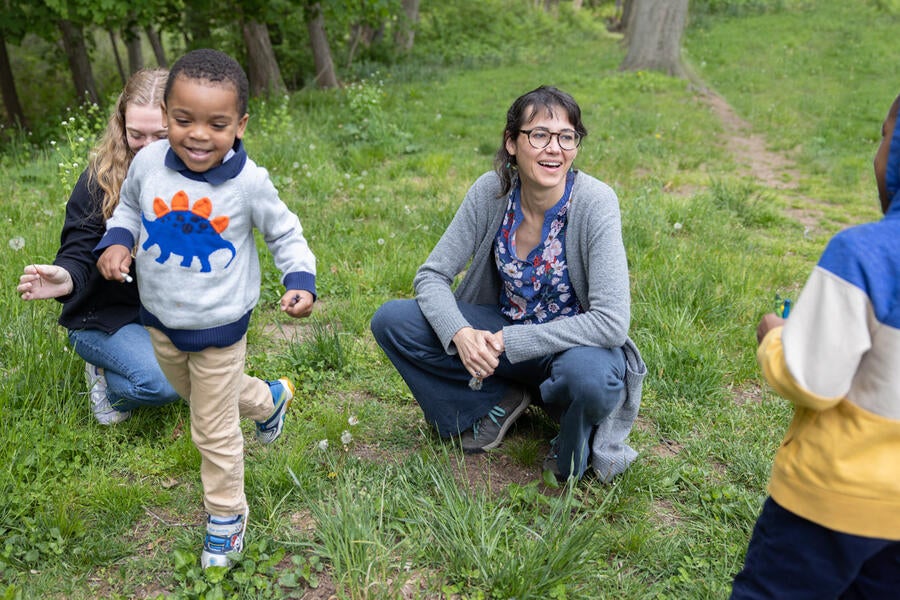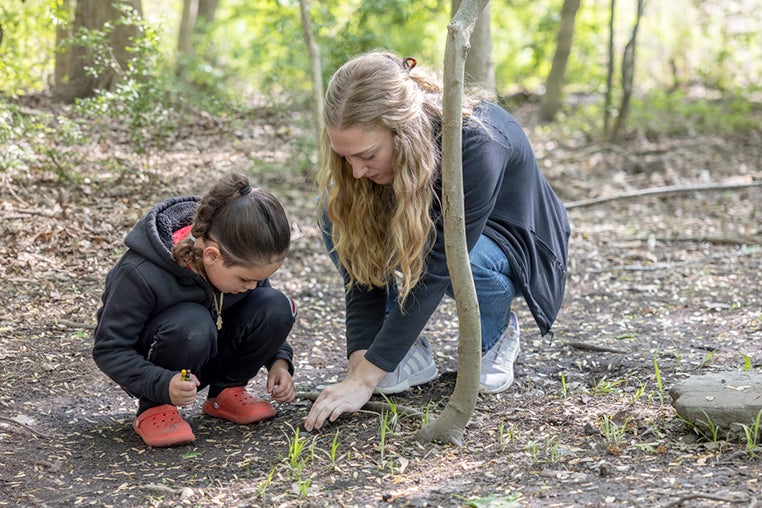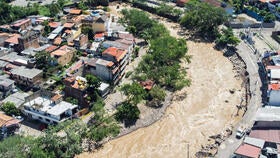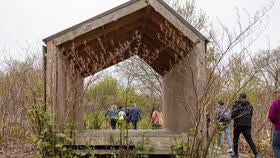
One recent spring afternoon, the door was open at the Trowbridge Environmental Center, in East Rock Park. Inside, a small sandbox in which to reenact animal footprints, plant terrariums, and colorful wildlife photographs signaled the space’s mission to provide hands-on education about the natural world. Outside, under the center’s pavilion, about a dozen children had gathered for that afternoon’s session of Exploring Nature, a program organized by Anna Pickett, the development and outreach manager at Urban Resources Initiative (URI), part of the Hixon Center for Urban Ecology at the Yale School of the Environment.
The cheerful scene reflected the productive partnership between URI, New Haven non-profits, and the city itself to renew park buildings that had fallen into disuse, turn them into community centers, and provide youth programming. East Rock Ranger Station — which includes the Trowbridge Environmental Center — was the first to open. After a request for proposals last fall, two nonprofits — URI, which, in addition to its university affiliation, is guided by a board of directors, and Monk Youth Jazz and STEAM Collective — were chosen to host programming on alternate afternoons during the space’s inaugural year.
URI’s program, Exploring Nature, offered three days of free activities spearheaded by Anna and Chris Ozyck, URI’s associate director: hikes, trail clean-ups, a book club, and wildlife and husbandry demonstrations. That afternoon, two beekeepers from Huneebee Project, a New Haven nonprofit that provides training in beekeeping for local youth, had brought a box of bees and a variety of beekeeping tools— a netted hood, gloves, and a smoker — for the kids to examine.
“Does anybody know what a bee’s job is?” asked Tim Dutcher, one of the beekeepers.
“They want to get pollen and make honey,” a girl ventured.
“That’s a great answer, but they don’t make the pollen into honey,” said Tim. “For honey, they collect something else —”
“Nectar!” a boy called out.
“That’s right!” Tim affirmed. “Okay, let’s head out into the park and walk around — we’re on a quest to find any bees out there doing their job in the world.”
 Taking a closer look at the forest floor; Photo by Robert DeSanto
Taking a closer look at the forest floor; Photo by Robert DeSanto
A prescription for the outdoors
Exploring Nature was a natural expansion of URI’s work within New Haven to restore and reclaim the urban environment by providing material support and training for community-driven projects. URI, led by Colleen Murphy-Dunning, runs both Community Greenspace, which facilitates community members’ work to replant and revitalize parks and gardens around the city, and GreenSkills, a jobs program that plants trees, free of charge, at New Haven residences and buildings.
With Exploring Nature, URI aimed “to enable more enjoyment of nature and the urban forest as well as to engage more volunteers in stewardship of the park,” says Anna. “We wanted to reach an audience of kids who don’t normally get out into nature.”
In a time when there were ever dwindling resources, budget constraints, and cutbacks, URI acted as the galvanizing force connecting the various groups across the city, and it continues to be the organization that provides a vision for the city’s greenspaces.
Anna worked with a number of community advocates to develop URI’s programming, including Amanda DeCew, a pediatric advanced practice registered nurse at Fair Haven Community Health Care who is also part of the New Haven Nature and Health Initiative. Amanda had begun writing prescriptions for kids to spend time in nature to support their mental and physical health — but recognized that her patients needed greater access to clean, safe greenspaces with amenities like bathrooms in order to make these prescriptions work. The newly refurbished East Rock ranger station offered such access.
Another community partner organization, Friends of East Rock Park (FERP), took on the task of further enhancing the interior of the Trowbridge Environmental Center — adding furniture and stocking bookshelves, and providing nature-based educational tools. FERP also hosted an open house at the Center once a month (the organization expects to resume hosting open houses in the fall).
Along with retired Yale staff member and URI board member Sue Wells, Anna reached out to local environmental experts and organizations to provide hands-on activities around community-sourced interests: maple sugaring, raptors and reptiles, fishing, and planting for pollinators, among many others. URI’s team also led their own workshops, including tree identification and animal tracking.
“In a time when there were ever dwindling resources, budget constraints, and cutbacks, URI acted as the galvanizing force connecting the various groups across the city, and it continues to be the organization that provides a vision for the city’s greenspaces,” says David Shimchick, who leads FERP. “They achieve a tremendous amount because they are constantly working to fulfill their mission.”
In mid-June, URI’s contract to provide programming ended; through the summer, city-run summer camps will use the space. In the fall, the city will accept a new round of proposals to provide programming in East Rock Park.
For its part, Exploring Nature accomplished several important goals: to get families reinvested in the park, to raise awareness of the educational materials and resources available inside the Trowbridge Environmental Center, and to provide training for the next generation to become stewards of the city’s green spaces. Over seven months, the program held 75 events and hosted nearly 300 adults and more than 350 children, many of whom became regular visitors.
“At URI, we strive to provide free and inclusive opportunities to encourage more people to get outside, explore nature, and feel welcome in East Rock Park, and we’re grateful for our partnerships with the city, Fair Haven Community Health Care, and many volunteers to take advantage of existing public resources to accomplish this goal,” says Anna. “Exploring Nature has welcomed many new people to get out in the woods — often for the very first time — and experience the mental and physical health benefits of being in nature.”






